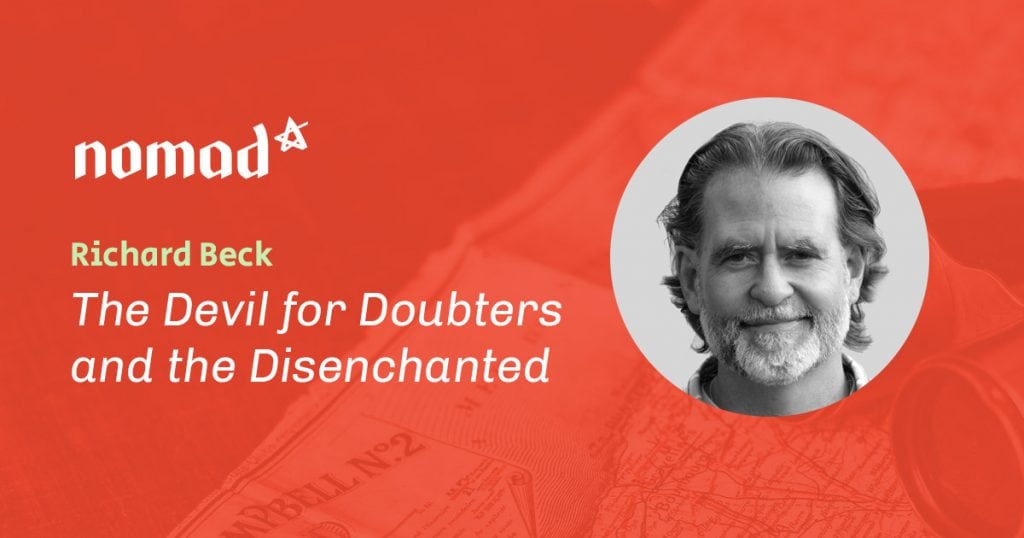What are 21st Century educated, questioning Christians supposed to make of the Devil and evil spirits? Are they literal spiritual beings who spend their time trying to lure us into sinful acts? Or should we see them as metaphors for social injustices that we need to confront? We ask professor of psychology, author and blogger Richard Beck.
Interview begins at 6m

Image provided by Richard Beck. Used with permission.
BOOKS
Reviving Old Scratch: Demons and the Devil for Doubters and the Disenchanted
WEBSITE
QUOTES
“When you doubt that there is a spiritual struggle going on, when you lack a theology of revolt, when you lack that warfare world view, all you have when you face suffering is this big theological puzzle that erodes your faith. And so for me, revitalising a theology of revolt, a vision of spiritual warfare is the kind of thing that kept me engaged in the face of suffering as I encountered it, and called me to action rather than left me ruminating.“
“Doubt and humility make us more hospitable to other people, so progressive and liberal Christians tend to be really good conversation partners with atheists and people from different faiths and that’s the positive side of doubt.”
“You have to turn towards reconstruction. How do you do that? I think spiritual warfare, revitalising a view of getting in the game, getting back in the fight instead of turning things like the problem of suffering into a logical puzzle, is a part of it. Also I think we have to find ways of reconnecting with enchantment and transcendence and mystery. I think we have to invest in community. I think it’s hard for some liberal and progressive Christians to invest in Christian community because they have negative feelings about a church of their childhood but I think it’s important to let other people carry our burden.”
Wow! Great interview. Richard’s use of “Winter Christians” & “Summer Christians” is a very palatable communication tool, Jesus used similar everyday examples to get his point across. The Winters seem to be stuck in a reactive flight or fight state, that originates back to the abuses of the RCC spawning the protestant reformation. I do think there has to be a moral law, enforced by the civil authorities, with principles shaped by the “golden rule” as found in many cultural philosophies such as Zoroastrianism, Old Testament Law, Christianity, Confucianism and Buddhism. These principles would be neutral regarding religion. Now regarding the devil and our thought life, there are Scriptures that indicate a battlefield within ourselves between flesh and spirit, for example as in Romans 7&8 or James 1 but specifically James ch 4. The 1st Book of Enoch was considered scripture by Jude who quotes it, and the Essenes (a separatist Jewish group living in the Dead Sea area during the second temple era, between the time of the Maccabees and the destruction of the second temple), had copies of this book as well. The First book of Enoch says a lot about the invisible spiritual forces. I would posit that these forces can be detected indirectly in the history of current & fallen nations. I personally consider the 1Enoch scripture. Some of the indirect Indications of this invisible spiritual parallel is seen in the Meso-american culture as well as in the history Japan. It is also seen in the many other mythologies of The Greeks, and Romans. I think mankind lost a coherent grasp on “The Truth” after the failure of Nimrod’s attempt to create a one world government. Nimrod’s plan opposed God’s command to fill the Earth, thus God confused our language forcing us to spread out. Within all these mythologies are hints of “Truth”, for example Pure Land Buddhism believes in a Buddha named Amida who saves those who call upon his name from a kind of hell, to be with him in a pure land Paradise. I cannot say Pure Land Buddhism wasn’t influenced by early Christianity, but it does allow for the teachings of Christianity to leaven it, as do all the post-flood religions that I have studied. Question is, do the invisible Spirit forces try to imitate “Truth” to keep us confused, or do they do it because they too are children of “Truth” gone astray? The book of Danial chapter 10.13-14 points out that different Angels are assigned to different Nations, some fallen others not. Finally I believe it is healthy to seek out truth through study, but also through practice. It’s a balance, we are called to love (ἀγάπη, agápē) our God with all our heart, mind, & physical strength, and our neighbor as ourselves, on these hang the Law and Prophets.
Thanks, Sean. Some really interesting insights there.
I am trying to get the conversation going on this podcast over at The Evangelical Universalist:
http://www.evangelicaluniversalist.com/forum/viewtopic.php?f=14&t=7122&p=105258#p105258
Cheers.
A very interesting thread. Thanks for sharing it. Tim